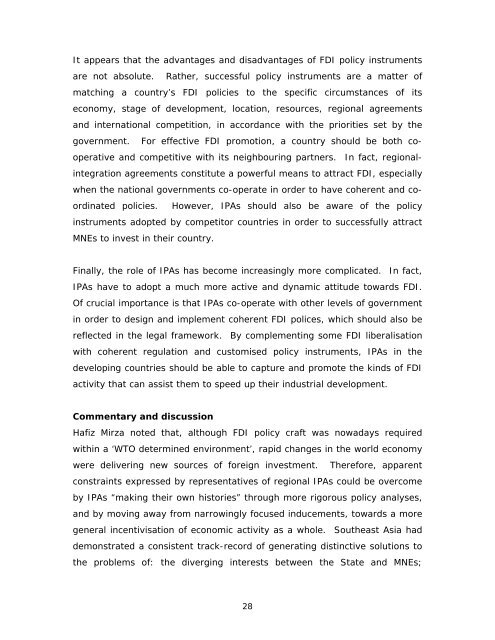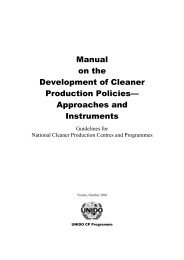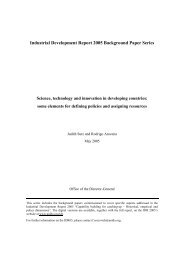(EGM) Foreign Direct Investment in Southeast Asia - Unido
(EGM) Foreign Direct Investment in Southeast Asia - Unido
(EGM) Foreign Direct Investment in Southeast Asia - Unido
Create successful ePaper yourself
Turn your PDF publications into a flip-book with our unique Google optimized e-Paper software.
It appears that the advantages and disadvantages of FDI policy <strong>in</strong>struments<br />
are not absolute. Rather, successful policy <strong>in</strong>struments are a matter of<br />
match<strong>in</strong>g a country’s FDI policies to the specific circumstances of its<br />
economy, stage of development, location, resources, regional agreements<br />
and <strong>in</strong>ternational competition, <strong>in</strong> accordance with the priorities set by the<br />
government. For effective FDI promotion, a country should be both co-<br />
operative and competitive with its neighbour<strong>in</strong>g partners. In fact, regional-<br />
<strong>in</strong>tegration agreements constitute a powerful means to attract FDI, especially<br />
when the national governments co-operate <strong>in</strong> order to have coherent and co-<br />
ord<strong>in</strong>ated policies. However, IPAs should also be aware of the policy<br />
<strong>in</strong>struments adopted by competitor countries <strong>in</strong> order to successfully attract<br />
MNEs to <strong>in</strong>vest <strong>in</strong> their country.<br />
F<strong>in</strong>ally, the role of IPAs has become <strong>in</strong>creas<strong>in</strong>gly more complicated. In fact,<br />
IPAs have to adopt a much more active and dynamic attitude towards FDI.<br />
Of crucial importance is that IPAs co-operate with other levels of government<br />
<strong>in</strong> order to design and implement coherent FDI polices, which should also be<br />
reflected <strong>in</strong> the legal framework. By complement<strong>in</strong>g some FDI liberalisation<br />
with coherent regulation and customised policy <strong>in</strong>struments, IPAs <strong>in</strong> the<br />
develop<strong>in</strong>g countries should be able to capture and promote the k<strong>in</strong>ds of FDI<br />
activity that can assist them to speed up their <strong>in</strong>dustrial development.<br />
Commentary and discussion<br />
Hafiz Mirza noted that, although FDI policy craft was nowadays required<br />
with<strong>in</strong> a ‘WTO determ<strong>in</strong>ed environment’, rapid changes <strong>in</strong> the world economy<br />
were deliver<strong>in</strong>g new sources of foreign <strong>in</strong>vestment. Therefore, apparent<br />
constra<strong>in</strong>ts expressed by representatives of regional IPAs could be overcome<br />
by IPAs “mak<strong>in</strong>g their own histories” through more rigorous policy analyses,<br />
and by mov<strong>in</strong>g away from narrow<strong>in</strong>gly focused <strong>in</strong>ducements, towards a more<br />
general <strong>in</strong>centivisation of economic activity as a whole. <strong>Southeast</strong> <strong>Asia</strong> had<br />
demonstrated a consistent track-record of generat<strong>in</strong>g dist<strong>in</strong>ctive solutions to<br />
the problems of: the diverg<strong>in</strong>g <strong>in</strong>terests between the State and MNEs;<br />
28

















